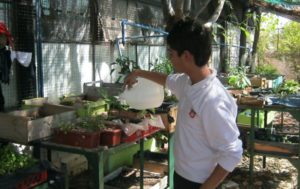
The National Environmental Certification System of Educational Institutions (SNCAE), is a intersectoral program implemented by the environment, the Ministry of Education, the National Forestry Corporation and UNESCO. In their Levels, the program incorporates a number of public and private institutions in development of environmental education. The SNCAE is a voluntary program that you can apply for Establishments of different levels and dependence, as much of preschool education as of basic and secondary education, including also special educational establishments and professional technicians. It is an innovative initiative for environmental management capable of incorporating the heterogeneity and diversity of the student world.
To this end, it promotes the installation of an environmental management system that includes and historical, cultural and territorial framework in which the educational unit is inserted. This, with the purpose of contribute to the strengthening of their autonomy, associative capacity and integrative vision of the role of school as an actor in local environmental management.
Example Curriculum: City of Lyon School
The City of Lyon school has been part of the Ministry of the Environment (MMA) program for six years, a period of time where they have developed a distinctive culture among their students, as the idea of being part of the Sncae arose to achieve a "Eco-pedagogy" that translates the teaching of students to families.
In the public establishment they made a restructuring of the pedagogical curriculum, integrating extra contents of recycling and incentive themes to care for the environment, which have been combined with the relationship they have with the environment and the community.
"We managed to reform the curriculum with an emphasis on our environmental part, which is why we incorporated two hours a week for all students from pre-kindergarten to 8th grade, because we are convinced to train people who have a different philosophy of life than any student," said Sergio Segovia, director of the City of Lyon school.
This school meets the certification requirements imposed by different governmental and non-governmental organizations, such as the Ministry of the Environment, Ministry of Education, Conaf and Unesco, which ensure an education that generates sustainable habits and behaviors.
"The important thing is that the schools in their educational project have the vision of sustainability that allows permeating the rest of the issues through the transversal contents to form community with their environment," said Damien Trivelli, who is head of the division Environmental education of the MMA.
The fact that an educational establishment is certified in environmental theme means that the contents that they impart have methodologies according to their environment, are related to the community and also part of its structure is ecological.
Sources
Programs for Implementing the Curriculum:
The process of environmental certification must begin long before that the educational establishment begins to process their certification. It is recommended that the establishment have an environmental education process with results before seeking certification. In turn it is it is extremely important that this task should not fall to an individual, but on the contrary is the responsibility of a Environmental Management Committee representative of the educational community, key to the success and sustainability of environmental education processes that are intended to be achieved. Once these two conditions are overcome, the establishment will be able to manage its environmental certification, in which process the following activities must be carried out:
1. Read the SNCAE procedure manual and / or at least the documents necessary for the execution of each task, so that you can know the deadlines and formats necessary to develop the administrative process. These documents are available at the following link:
http://www.mma.gob.cl/educacionambiental/1319/w3-propertyvalue-16367.html
2. Evaluate the situation of environmental education in the establishment and complete the environmental self-diagnosis report. With this you can select a level of application (Basic, Medium or Excellence.)
3. Request access code on the SNCAE electronic platform. http://scp.idem.gob.cl
4. Submit the environmental self-report.
5. Send the environmental certification file, document that will inform the progress made and the state of environmental education in the establishment.
After sending the file it will be reviewed by the Regional Environmental Certification Committee who will evaluate whether or not to certify the educational establishment.